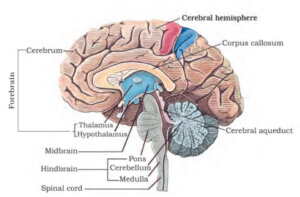Neural Control and Coordination MCQ/Objective Question Chapter 21 Biology
Which system in our body is responsible for control and coordination?
- a. Nervous system
- b. Endocrine system
- c. Both
- d. None
Which among these is not a part of central nervous system?
- a. Brain
- b. Spinal cord
- c. Peripheral nervous system
- d. None
Large granular body that make proteins in a neural cell is
- a. Nissl’s granules
- b. Golgi body
- c. Organ of Corti
- d. Otolith
The part of neuron that receive signal is:
- a. Dendrite
- b. Axon
- c. Axon terminal
- d. Cell body
Which part of neuron release neurotransmitters?
- a. Dendrite
- b. Axon
- c. Axon terminal
- d. Cell body
Which among these is a inhibitory neurotransmitter?
- a. Acetylcholine
- b. Glutamate
- c. GABA and serotonin
- d. None
Which among these is a excitatory neurotransmitter?
- a. Ach
- b. Epinephrine
- c. Histamine
- d. All
Schwann cells are present in:
- a. Myelinated cells
- b. Non-myelinated cells
- c. Both
- d. None
Whiat is the charge inside a resting neuron?
- a. +ve
- b. -ve
- c. Neutral
- d. None
The Na+ and K+ channel transport at axonal membrane is:
- a. Symport
- b. Anti-port
- c. Uniport
- d. None
Name the group of nerve fibres that connect the two cerebral hemisphere?
- a. Pons Varolii
- b. Hippocampal lobe
- c. Corpus callosum
- d. Corpora quadrigemina
The limbic system is a complex system responsible for sexual behavior, emotional expressions like excitement, enjoyment, etc. Which among these is not a part of the limbic system?
- a. Hypothalamus

- b. Inner layer of the cerebrum
- c. Medulla oblongata
- d. Amygdalin and hippocampus
The part of brain that connects with spinal cord is:
- a. Cerebrum
- b. Midbrain
- c. Cerebellum
- d. None
The part of brain related with processing of knowledge and thinking is:
- a. Cerebrum
- b. Midbrain
- c. Cerebellum
- d. None
Which part of the brain control rate of respiration and cardiovascular rexflex?
- a. Midbrain
- b. Pons
- c. Cerebellum
- d. Cerebrum
Part of the brain that control memory is:
- a. Amygdalin
- b. Hippocampus
- c. Neo-cortex
- d. All three
Which part of the brain control the chemical signals in the body?
- a. Midbrain
- b. Hypothalamus
- c. Cerebrum
- d. Cerebellum
Which part of the brain among these options is not associated with reflex action?
- a. Spinal cord
- b. Afferent neuron
- c. Efferent neuron
- d. Medulla oblongata
Which of the following is not a sensory receptor?
- a. Gustatory receptor
- b. Olfactory bulb
- c. Pacinian corpuscles
- d. Dorsal root ganglion
The recptor which detect the colour is
- a. Rods
- b. Cones
- c. Both
- d. None
How many types of cone cells are there in the eye?
- a. One
- b. Two
- c. Three.
- d. Four
Place of highest visual acuity is:
- a. Blindspot
- b. Macula Lutea
- c. Fovea centralis
- d. None
Vitreous humor is present between which two part of the eye?
- a. Retina and the lens
- b. Lens and the Retina
- c. Both
- d. None
Defficiency of which vitamin cause night blindness?
- a. A
- b. B
- c. E
- d. K
Failure of iris muscle to adjust the lens lead to
- a. Short-sightedness
- b. Farsightedness
- c. Both
- d. None
Corpora quadrigemina of the brain process?
- a. Auditory signals
- b. Visual signals
- c. Smell
- d. None
Smallest bone of the body is:
- a. Malleus
- b. incus
- c. Stapes
- d. Radius
Main function of inner ear is to:
- a. Hear
- b. Balance
- c. Chemical detection
- d. None
Which receptor is sensitive to auditory signals?
- a. Reissner’s membrane
- b. Organ of Corti
- c. Crista and macula
- d. None
Which gland is innervated with nerve signals from hypothalamus?
- a. Pituitary
- b. Thyroid
- c. Parathyroid
- d. Pancreas
Which among these is not a ear bone (ossicle)?
- a. Stapes
- b. Incus
- c. Malleus
- d. Otolith
Which among these is not a part of vestibular apparatus
- a. Semicircular canals
- b. Macula
- c. Cochlea
- d. b and c
See also:
- Locomotion and Movement MCQ
- Excretory Products and Their Elimination MCQ
- Body Fluids and Circulation MCQ
Neural Control and Coordination MCQ/Objective Question Chapter 21 Biology
Ref: Chapter 18.